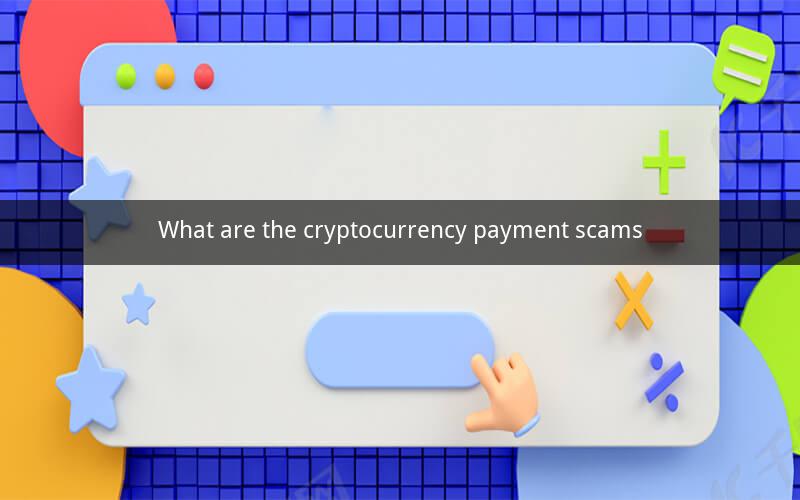
Table of Contents
1. Introduction
2. Definition of Cryptocurrency Payment Scams
3. Types of Cryptocurrency Payment Scams
4. How Cryptocurrency Payment Scams Occur
5. Prevention of Cryptocurrency Payment Scams
6. Detection of Cryptocurrency Payment Scams
7. Legal Aspects of Cryptocurrency Payment Scams
8. Case Studies of Cryptocurrency Payment Scams
9. The Future of Cryptocurrency Payment Scams
10. Conclusion
1. Introduction
Cryptocurrency payment scams have become a significant concern in the rapidly growing world of digital currencies. With the increasing popularity of cryptocurrencies, cybercriminals have found new ways to exploit unsuspecting individuals. In this article, we will explore what cryptocurrency payment scams are, their types, how they occur, prevention measures, detection methods, legal aspects, case studies, and the future implications.
2. Definition of Cryptocurrency Payment Scams
A cryptocurrency payment scam is an fraudulent scheme in which individuals or entities deceive others into transferring cryptocurrency to them without delivering the promised goods or services. These scams often involve sophisticated tactics, making it challenging for victims to trace or recover their lost funds.
3. Types of Cryptocurrency Payment Scams
a. Phishing Attacks
Phishing attacks involve sending fraudulent emails or messages that appear to come from legitimate sources, tricking individuals into providing their private keys or other sensitive information.
b. Fake Exchanges
Scammers create fake cryptocurrency exchanges, enticing users to deposit their funds. Once the users deposit, the exchanges vanish with the funds, leaving the users with no way to retrieve their money.
c. Ponzi Schemes
Ponzi schemes involve promising high returns on investments with little to no risk. The scammers attract new investors with false promises, using their money to pay returns to earlier investors, until the scheme collapses.
d. Fake Wallets
Scammers develop fake cryptocurrency wallets that appear genuine. When users download and use these wallets, their private keys are compromised, and the scammers can access and steal their funds.
4. How Cryptocurrency Payment Scams Occur
Cryptocurrency payment scams occur due to a combination of factors, including:
a. Lack of awareness: Many individuals are unfamiliar with cryptocurrencies and their associated risks, making them easy targets for scammers.
b. Anonymity: The anonymous nature of cryptocurrencies allows scammers to operate without being easily traced.
c. Technical limitations: Cryptocurrency transactions are irreversible, which means once the funds are transferred, there is no way to retrieve them.
5. Prevention of Cryptocurrency Payment Scams
To prevent falling victim to cryptocurrency payment scams, consider the following measures:
a. Stay informed: Keep up to date with the latest news and trends in the cryptocurrency world to identify potential scams.
b. Use reputable platforms: Only transact on trusted cryptocurrency exchanges, wallets, and payment systems.
c. Be cautious with private keys: Never share your private keys with anyone, as they grant access to your funds.
d. Verify identities: Ensure the person or entity you are transacting with is legitimate before proceeding.
6. Detection of Cryptocurrency Payment Scams
Detecting cryptocurrency payment scams can be challenging, but some signs to watch out for include:
a. Unbelievably high returns: If an investment opportunity seems too good to be true, it likely is a scam.
b. Requests for private keys: Scammers will often ask for your private keys to facilitate the transaction, which should raise red flags.
c. Urgent messages: Scammers often use time-sensitive tactics to pressure victims into making decisions quickly.
7. Legal Aspects of Cryptocurrency Payment Scams
The legal aspects of cryptocurrency payment scams vary by country. Many governments have taken steps to regulate the cryptocurrency market and impose penalties on scammers. However, the lack of a centralized authority in the cryptocurrency space makes it challenging to enforce these regulations.
8. Case Studies of Cryptocurrency Payment Scams
Numerous high-profile cryptocurrency payment scams have been reported, including:
a. The Mt. Gox Scandal: In 2014, the Tokyo-based cryptocurrency exchange Mt. Gox filed for bankruptcy after losing over 850,000 Bitcoin to a hack.
b. QuadrigaCX: The Canadian cryptocurrency exchange QuadrigaCX filed for bankruptcy in 2019 after founder Gerald Cotten passed away, leaving customers with millions of dollars in frozen funds.
9. The Future of Cryptocurrency Payment Scams
As cryptocurrencies continue to grow in popularity, so will the number of scams targeting individuals and businesses. The future will likely see advancements in technology and regulations aimed at mitigating these risks. However, the inherent anonymity of cryptocurrencies will always present a challenge for authorities in combating payment scams.
10. Conclusion
Cryptocurrency payment scams are a serious concern for those involved in the digital currency market. By staying informed, using reputable platforms, and exercising caution, individuals and businesses can minimize their risk of falling victim to these scams. As the cryptocurrency landscape evolves, so too will the methods employed by scammers, necessitating ongoing vigilance and adaptation.
Questions:
1. What are some common indicators of a cryptocurrency phishing attack?
2. How can individuals protect their private keys from being compromised?
3. What legal consequences can scammers face for engaging in cryptocurrency payment scams?
4. Are there any notable differences between traditional financial scams and cryptocurrency payment scams?
5. How can businesses detect and prevent cryptocurrency payment scams within their organization?
6. In what ways can governments collaborate to combat cryptocurrency payment scams?
7. What role does blockchain technology play in the prevention and detection of cryptocurrency payment scams?
8. Can individuals recover their funds if they fall victim to a cryptocurrency payment scam?
9. How has the Mt. Gox scandal impacted the cryptocurrency market?
10. What measures can be taken to ensure the security of cryptocurrency transactions?